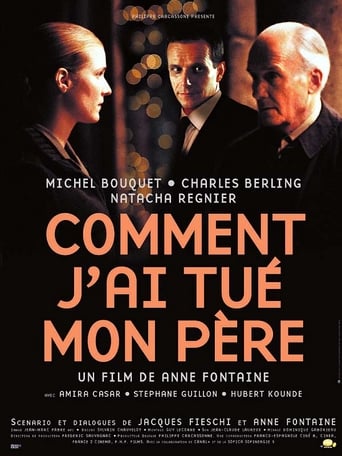

The Age of Commercialism
... View MoreMemorable, crazy movie
... View MoreThe film creates a perfect balance between action and depth of basic needs, in the midst of an infertile atmosphere.
... View MoreThis is a small, humorous movie in some ways, but it has a huge heart. What a nice experience.
... View MoreThe French movie "Comment j'ai tué mon pèrr (2001)" was shown in the U.S. with the title, "How I Killed My Father", but is also known as "My Father and I." The film was co-written and directed by Anne Fontaine.The movie stars Charles Berling, who portrays Jean-Luc, a successful gerontologist. (Successful in financial terms. He runs a boutique medical clinic for older people who can afford his fees, and who wish to retain their youthfulness.) He is very wealthy.Jean-Luc has it all--a beautiful wife (Natacha Régnier), a beautiful mistress (Amira Casar), and the time and money to utilize the services of a prostitute when he chooses. He's not completely happy, because it's hard to juggle his time at the clinic and in all those bedrooms. Still, he's contented and satisfied in his own cold, aloof, way.The plot begins with the arrival of his father, Maurice, played by the brilliant French actor Michel Bouquet. Maurice is also a physician. He has spent many years in Africa, which sounds noble. However, he simply walked out on his family when Jean- Luc and his brother were young. We gather from context that, even before he left, he didn't spend much time with his family. Maurice apparently did well enough in Africa until the government changed, when he was briefly imprisoned and then expelled from the country. Now he is in Versailles, observing and waiting.Although there are many sub-plots, they all revolve around Jean-Luc. As the movie progresses, you begin to see that he's not only cold and aloof, but also manipulative and selfish. Maurice is no saint, but he's a better person than his son.This isn't a film that you must find and see, but it definitely has some strengths, especially the acting by Berling and Bouquet. We saw it on an old VHS tape, and it worked well on the small screen.
... View More'Comment J'ai Tu Mon Pere' is the story of an apparently untroubled man whose control over his own life is threatened by the return of his difficult long-lost father. It's also one of those typically French films where everyone is beautiful and the drama proceeds by the subtlest of inflexion. And I find myself more willing to tolerate the first fault than I would be in an American film, partly because the characters are truly beautiful (in Hollyowood films they are often just healthy), and partly because of the second virtue. That is to say, the acting, script, cinematography and music are all superb, they bring a pained (and changing) life to this story where (superficially) nothing happens. It's true that you probably won't like this film if you do like the latest blockbuster; but the loss will all yours.
... View MoreHow I Killed My Father (aka My Father and I) is a story about parental abandonment and filial rage, told in a very calm way. The characters hardly ever break a sweat as they deal with irresponsible fathers, feckless siblings, childlessness and the other griefs of life. The locale is, after all, Versailles, and the emotional temperature never gets above zero in those manicured gardens.Jean-Luc invents a family for himself to replace the one he lost at the age of ten. He becomes a father substitute for his brother Patrick--imagine having your brother as chauffeur and gofer. He presides over this clinic for rich middle-aged people trying to regain their youth, much like a father and his children. If his wife is tiring of being an ornament, he can handle her moods: after all, he's got her believing she can't have kids. The mistress at the clinic can be kept happy by the promise of an apartment. The only thing he can't allow is to be abandoned by any of them.The conflict with his father is the occasion for many droll exchanges between Charles Berling and Michel Bouquet. Jacques Fieschi, the co-author of this script, also wrote Un coeur en hiver, Nelly & Monsieur Arnaud and Sade, some of my favorite studies of bleak hearts in comfortable surroundings.
... View MoreThe pace, the images, the characters in this film are deliciously meditative...and although universal in its content, very French in its presentation. Not a film for Americans who want an action-packed, easily accessible narrative. But those who enjoy an intelligent exploration of relationships at a deep even profound level will find this movie to their liking.The basic line sets up the life of a very successful gerontologist, dealing in anti-aging methods, married to a beautiful, compliant young woman and also involved sexually with his attractive assistant. When he receives a letter telling him his father, who has been a doctor in Africa and deserted his family many years ago, has died, we are given a revery from his imagination. In this reflection, his father appears at his elegant home and the rest of the film explores the son's complex relationship and emotions relative to what he believes these might be, should his father actually show up. A very interesting devise...using classic projection and giving us the challenging question "What is real and what is imagined".The cast is superb...with special kudos to Michael Bouquet and Charles Berling, the leads.I recently saw "Life As A House"...and while the performances were fine...the movie itself...dealing again with a father-son relationship...was such a mish-mash of extraneous characters, the real focus and profundity were lost in the Hollywood glitter of it all. This Anne Fontaine film keeps the color so wonderfully subdued, almost a sense of black and white, that the visual aspect is moodily effective and appropriate to its theme.
... View More